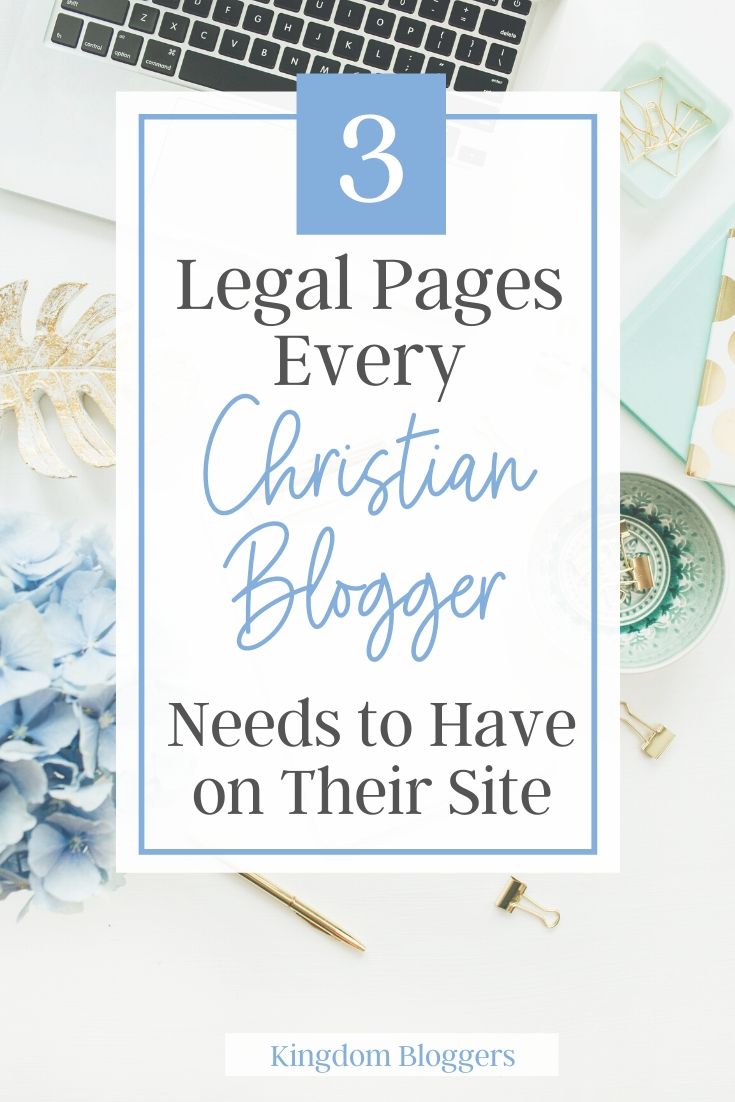Start a Christian blog, they said. It will be easy!
I’m sure by now you’ve realized that was just a flat-out lie lol! Blogging takes work! First with all the SEO and technical stuff – and now you have to worry about legal stuff too!
Hopefully, this post will help you understand the legal pages for websites and blogs and help you get the necessary pages in place to keep it all legal.

This post may contain affiliate links. Read our full disclosure here.
Why Do I Need Legal Pages for My Christian Blog
“I’m just a Christian blogger who shares a little bit of Jesus. I don’t sell anything – so why do I need legal pages?”
The truth is that every single blog (or another type of website) must have certain legal pages to comply with the law and to protect themselves from frivolous lawsuits.
Understanding the reasons for having them and which ones you need will help you keep your Christian blog legal and possibly prevent at least a few gray hairs later on!
Legal Pages Help You Comply with the Law
Regardless of whether you monetize your Christian blog or not, your website is subject to a variety of legal requirements such as having a GDPR and CCPA-compliant Privacy Policy (discussed later).
Not having these can result in hefty fines and/or lawsuits.
Legal Pages Help Yor Protect Your Intellectual Property
You’ve worked hard on your Christian blog! Whether it be the images and graphics, the written content, or even the freebies to offer your subscribers – you want to make sure that you have legal recourse if someone takes your material and uses it without permission.
While you can’t prevent them from taking it, your legal pages let readers know that the contents of your site are copyrighted and can not be reproduced (copied) without explicit permission. If someone does copy your property without your permission, you can file a DCMA Takedown Notice with their hosting service.
Legal Pages Release You From Personal Liability
In this day and age, everyone goes to the internet to search for advice for everything under the sun. Sometimes they search for simple things, but other times they are seeking medical/mental health advice or other things that should be discussed with a professional.
While you may offer suggestions for ways that you’ve dealt with things, you must let readers know that your content is simply your opinion and not professional advice (unless, of course, you are a licensed professional).
Even for sites such as Kingdom Bloggers – which teaches bloggers how to navigate the blogging world, I make it clear that I cannot guarantee they’ll have the same results as me and everyone will have different results (based on different factors).
Your Personal Liability Disclaimer needs to be specific to your niche – and not general in nature.
Legal Pages Let Readers Know Your Terms of Use
It is important to let visitors to your site know what is acceptable (and not acceptable) while they are on your site. Things such as letting readers know if the content is for persons over the age of 18. Also, things like telling readers that abusive language or spam behavior in comments won’t be tolerated.
Legal Pages Disclose Affiliate Relationships
If you use affiliate links (or publish sponsored content), the FTC requires that you disclose this to your readers. This is required to ensure transparency, honesty and to prevent misleading advertising – ultimately to protect the readers (consumers).
What Legal Pages Do I Need as a Christian Blogger
There are several different legal pages that are important for Christian bloggers. Some of these are mandatory to comply with the law, others are necessary to protect your business.
Privacy Policy
Unlike some of the other legal pages that we will talk about, a privacy policy is mandatory. By law, every website must have a privacy policy. This is to ensure that you, the website administrator, are ensuring the privacy of users’ data. Many Christians bloggers don’t even realize they collect the data of their users!
When I’ve talked to some new Christian bloggers about GDPR (discussed below), they immediately say they don’t collect anything because they don’t have their subscriber forms set up yet. Or they say they don’t sell anything so aren’t collecting credit card data.
Every website, by virtue of it being accessible on the internet, collects user data in some way! Some types of data include:
- name and email address (subscriber forms)
- comments at the end of the blog post
- browser cookies
- Google Analytics tracking cookies
- tracking from 3rd party apps such as social sharing plugins
What is a Privacy Policy?
A privacy policy, in a nutshell, lets your readers know what type of data is being collected and exactly how it will be used. It also lets readers know how they can opt out of certain tracking features (such as browser tracking, etc), and how you will notify them in the event of a data breach if your site is ever compromised.
Your privacy policy must include specific information to be in compliance with
- GDPR – (General Data Protection Regulation) GDPR was enacted by the European Union (EU) to ensure that the data of EU citizens is protected. Even if you don’t specifically market to EU citizens, they can still find and visit your blog and, as such, you must ensure the strictest measures are followed to protect their data. You can read an overview of GDPR here.
- CCPA – (California Consumer Privacy Act) CCPA is similar to GDPR but is specific to residents of California.
Disclaimer
The next legal page you’ll want to have is a Disclaimer page. While this isn’t something required by law, it is something that you need to help protect yourself from lawsuits or other legal annoyances.
Some things to include on a Disclaimer include (but not limited to):
- Affiliate relationships (you can also create a separate page just for your affiliate disclosure)
- That your content is your opinion and should not be taken as professional advice
- For multi-author sites, that you are not liable for the opinions of your writers
- That you are free from liability from the 3rd party services/apps used on your site
These are just a handful of things you may want to include. Your Disclaimer should be niche-specific. For example, I mentioned earlier about me teaching blogging and that I do not guarantee that others will have the exact same results as I have.
Terms of Website Use
The final legal page that you’ll want to have is the Terms and Conditions. This is sometimes also called a Terms of Use.
This is where you outline the terms for users of your site. In simplest terms, this is like when you enter a military base where there is a big sign that says you are subject to being searched, you can’t bring weapons on, and you must have proper clearance to be able to come in.
Or a store in the mall that has a sign on the window that states you can’t bring food or drink inside, all sales are final (or what the return policy is).
The bottom line is that if you want to enter either of these places, you accept their terms. If you violate the terms, they kick you out!
For a Christian blog, of course, we aren’t dealing with body searches and weapons, but we still need to let our readers know what the “rules” are for hanging out on our site and/or using any of our services (if applicable).
This can be as simple as informing them of
- intellectual property rights (they can’t copy your content without permission)
- comment etiquette
- intended age that content was created for
- If you sell products or offer services from your site, your terms of use should also include a return/exchange policy.
Finally, your Terms and Conditions lets the user know the repercussion of not following the rules. While you won’t necessarily block someone from your website (you can block an IP address but they can always access it from another one), you can delete them from your email list, block them from a private FB group, etc.
By stating this upfront, you have a legally-binding document if they tried to challenge your “kicking them out” in court.
How to Make Your Christian Blog Legal
I don’t know about you, but I’m definitely NOT an attorney! Nor do I understand even a fraction of the legal jargon that is written on the official websites that discuss website legal compliance! Seriously! My head hurts from just browsing these pages lol!
If you have the funds, you can hire an attorney to help you in creating the necessary legal pages that you need for your website. But this can get really expensive and most Christian bloggers I know can’t afford that.
You can also find several free policy generators online, however, you can’t guarantee they contain all the required legal stuff (or if they are updated as the laws change).
Instead of going broke, you can opt to purchase a legal template bundle that can be edited to meet your needs. Make sure you get one from an actual attorney who specializes in legal pages for bloggers and online content creators.
Two that I highly recommend are:
- Legal Bundle from A Self Guru – Amira is a business lawyer, helping entrepreneurs, comply with the laws and protect their online businesses legally with affordable legal templates and coaching. She also has a wonderful Facebook group for customers to get additional help with getting their templates to meet their exact needs.
- Entrepreneur Legal Corner – Marian is a former attorney-turned-entrepreneur who also serves the blogging community by providing legal page templates to meet a variety of needs. I use her templates here on Kingdom Bloggers. You can use code kingdom10 to get 10% off any template or bundle.
